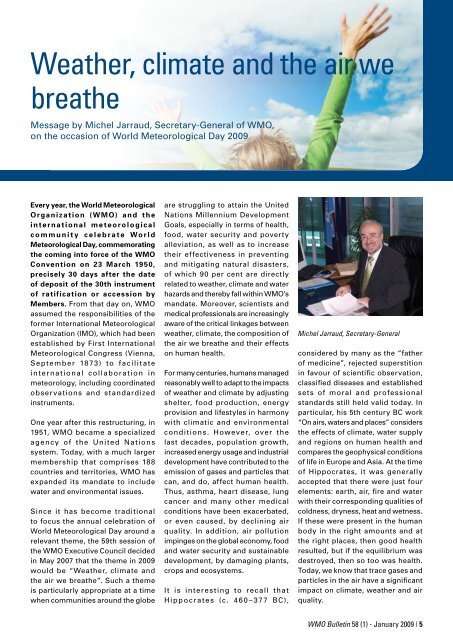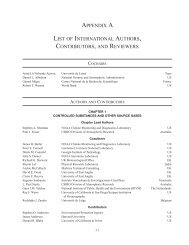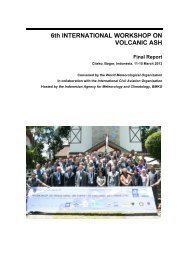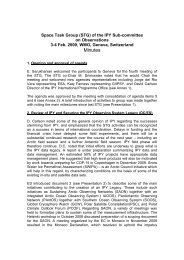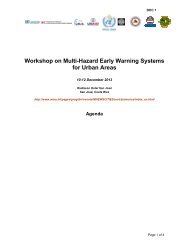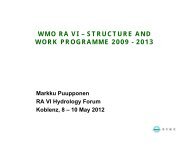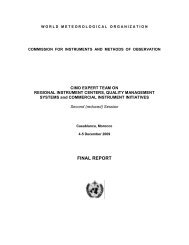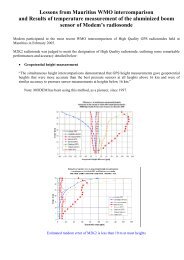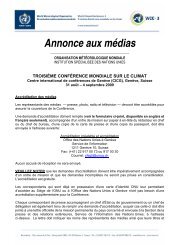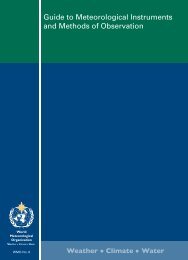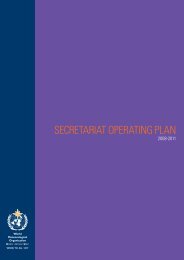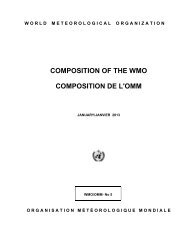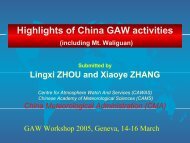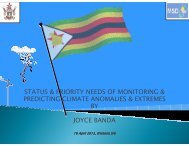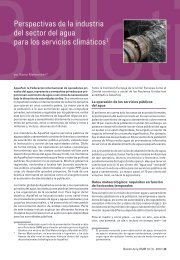Weather, climate and the air we breathe - WMO
Weather, climate and the air we breathe - WMO
Weather, climate and the air we breathe - WMO
You also want an ePaper? Increase the reach of your titles
YUMPU automatically turns print PDFs into web optimized ePapers that Google loves.
<strong>Wea<strong>the</strong>r</strong>, <strong>climate</strong> <strong>and</strong> <strong>the</strong> <strong>air</strong> <strong>we</strong><br />
brea<strong>the</strong><br />
Title<br />
Message by Michel Jarraud, Secretary-General of <strong>WMO</strong>,<br />
on <strong>the</strong> occasion of World Meteorological Day 2009<br />
Every year, <strong>the</strong> World Meteorological<br />
Organization (<strong>WMO</strong>) <strong>and</strong> <strong>the</strong><br />
international meteorological<br />
community celebrate World<br />
Meteorological Day, commemorating<br />
<strong>the</strong> coming into force of <strong>the</strong> <strong>WMO</strong><br />
Convention on 23 March 1950,<br />
precisely 30 days after <strong>the</strong> date<br />
of deposit of <strong>the</strong> 30th instrument<br />
of ratification or accession by<br />
Members. From that day on, <strong>WMO</strong><br />
assumed <strong>the</strong> responsibilities of <strong>the</strong><br />
former International Meteorological<br />
Organization (IMO), which had been<br />
established by First International<br />
Meteorological Congress (Vienna,<br />
September 1873) to facilitate<br />
international collaboration in<br />
meteorology, including coordinated<br />
observations <strong>and</strong> st<strong>and</strong>ardized<br />
instruments.<br />
One year after this restructuring, in<br />
1951, <strong>WMO</strong> became a specialized<br />
agency of <strong>the</strong> United Nations<br />
system. Today, with a much larger<br />
membership that comprises 188<br />
countries <strong>and</strong> territories, <strong>WMO</strong> has<br />
exp<strong>and</strong>ed its m<strong>and</strong>ate to include<br />
water <strong>and</strong> environmental issues.<br />
Since it has become traditional<br />
to focus <strong>the</strong> annual celebration of<br />
World Meteorological Day around a<br />
relevant <strong>the</strong>me, <strong>the</strong> 59th session of<br />
<strong>the</strong> <strong>WMO</strong> Executive Council decided<br />
in May 2007 that <strong>the</strong> <strong>the</strong>me in 2009<br />
would be “<strong>Wea<strong>the</strong>r</strong>, <strong>climate</strong> <strong>and</strong><br />
<strong>the</strong> <strong>air</strong> <strong>we</strong> brea<strong>the</strong>”. Such a <strong>the</strong>me<br />
is particularly appropriate at a time<br />
when communities around <strong>the</strong> globe<br />
are struggling to attain <strong>the</strong> United<br />
Nations Millennium Development<br />
Goals, especially in terms of health,<br />
food, water security <strong>and</strong> poverty<br />
alleviation, as <strong>we</strong>ll as to increase<br />
<strong>the</strong>ir effectiveness in preventing<br />
<strong>and</strong> mitigating natural disasters,<br />
of which 90 per cent are directly<br />
related to <strong>we</strong>a<strong>the</strong>r, <strong>climate</strong> <strong>and</strong> water<br />
hazards <strong>and</strong> <strong>the</strong>reby fall within <strong>WMO</strong>’s<br />
m<strong>and</strong>ate. Moreover, scientists <strong>and</strong><br />
medical professionals are increasingly<br />
aware of <strong>the</strong> critical linkages bet<strong>we</strong>en<br />
<strong>we</strong>a<strong>the</strong>r, <strong>climate</strong>, <strong>the</strong> composition of<br />
<strong>the</strong> <strong>air</strong> <strong>we</strong> brea<strong>the</strong> <strong>and</strong> <strong>the</strong>ir effects<br />
on human health.<br />
For many centuries, humans managed<br />
reasonably <strong>we</strong>ll to adapt to <strong>the</strong> impacts<br />
of <strong>we</strong>a<strong>the</strong>r <strong>and</strong> <strong>climate</strong> by adjusting<br />
shelter, food production, energy<br />
provision <strong>and</strong> lifestyles in harmony<br />
with climatic <strong>and</strong> environmental<br />
conditions. Ho<strong>we</strong>ver, over <strong>the</strong><br />
last decades, population growth,<br />
increased energy usage <strong>and</strong> industrial<br />
development have contributed to <strong>the</strong><br />
emission of gases <strong>and</strong> particles that<br />
can, <strong>and</strong> do, affect human health.<br />
Thus, asthma, heart disease, lung<br />
cancer <strong>and</strong> many o<strong>the</strong>r medical<br />
conditions have been exacerbated,<br />
or even caused, by declining <strong>air</strong><br />
quality. In addition, <strong>air</strong> pollution<br />
impinges on <strong>the</strong> global economy, food<br />
<strong>and</strong> water security <strong>and</strong> sustainable<br />
development, by damaging plants,<br />
crops <strong>and</strong> ecosystems.<br />
It is interesting to recall that<br />
Hippocrates (c. 460–377 BC),<br />
Michel Jarraud, Secretary-General<br />
considered by many as <strong>the</strong> “fa<strong>the</strong>r<br />
of medicine”, rejected superstition<br />
in favour of scientific observation,<br />
classified diseases <strong>and</strong> established<br />
sets of moral <strong>and</strong> professional<br />
st<strong>and</strong>ards still held valid today. In<br />
particular, his 5th century BC work<br />
“On <strong>air</strong>s, waters <strong>and</strong> places” considers<br />
<strong>the</strong> effects of <strong>climate</strong>, water supply<br />
<strong>and</strong> regions on human health <strong>and</strong><br />
compares <strong>the</strong> geophysical conditions<br />
of life in Europe <strong>and</strong> Asia. At <strong>the</strong> time<br />
of Hippocrates, it was generally<br />
accepted that <strong>the</strong>re <strong>we</strong>re just four<br />
elements: earth, <strong>air</strong>, fire <strong>and</strong> water<br />
with <strong>the</strong>ir corresponding qualities of<br />
coldness, dryness, heat <strong>and</strong> <strong>we</strong>tness.<br />
If <strong>the</strong>se <strong>we</strong>re present in <strong>the</strong> human<br />
body in <strong>the</strong> right amounts <strong>and</strong> at<br />
<strong>the</strong> right places, <strong>the</strong>n good health<br />
resulted, but if <strong>the</strong> equilibrium was<br />
destroyed, <strong>the</strong>n so too was health.<br />
Today, <strong>we</strong> know that trace gases <strong>and</strong><br />
particles in <strong>the</strong> <strong>air</strong> have a significant<br />
impact on <strong>climate</strong>, <strong>we</strong>a<strong>the</strong>r <strong>and</strong> <strong>air</strong><br />
quality.<br />
<strong>WMO</strong> Bulletin 58 (1) - January 2009 | 5


